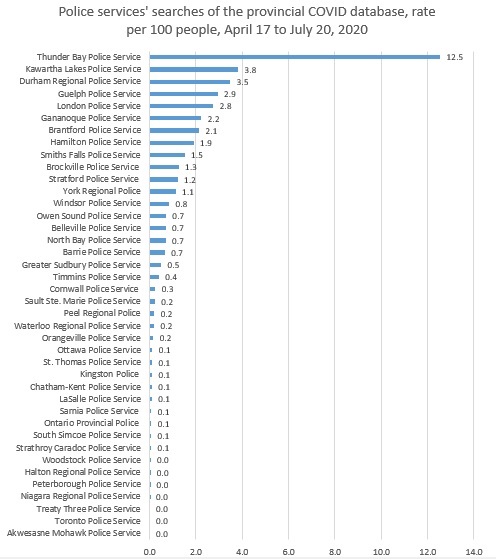Several human rights groups are concerned over the Thunder Bay Police Service’s “abnormally high” number of searches of Ontario’s COVID-19 database, which they say the service has accessed at the highest per capita rate in the province.

Following a legal challenge that was initiated by the human rights organizations — the Canadian Civil Liberties Association, Aboriginal Legal Services, the Black Legal Action Centre, and HIV and AIDS Legal Clinic Ontario — police no longer have access to the data, although the groups are still concerned about previous access and use of the information.
“Records we have received from the province indicate that the Thunder Bay Police Service accessed the provincial COVID database 14,831 times while it was active,” the organizations’ leaders said in a letter addressed to Thunder Bay Police Services Board chair Georjann Morriseau.
“Taking into account the population served by the Thunder Bay Police Service, the TBPS accessed the personal health information in the database at a per capita rate that was 10 times higher than the provincial average — even though the area has reported only 100 positive cases since the outset of the pandemic.”
According to the human rights groups, records they’ve received indicate that the Thunder Bay Police Service accessed provincial COVID-19 data the second most number of times to the Durham Regional Regional Police Service, between April 17 and July 20.


“The abnormally high number of times the data was accessed raises concerns about whether the database was being used appropriately and whether this large amount of personal information is still being used locally,” the letter reads.
“We request that the police services board require the Thunder Bay Police Service to undertake an audit of the use of the database and make the results of the audit available to the board and the public.”

Get weekly health news
In a statement to Global News, Chris Adams, the Thunder Bay Police Service’s communications and technology director, said the service is reviewing the issues raised with regards to its access of the province’s COVID-19 data.
“We will be addressing this in a report to our police services board in the near future and will be better able to comment after that,” Adams said in an email.
In April, the Ontario government passed an emergency order that allowed police to get the names, addresses and dates of birth of people who tested positive for COVID-19.
In mid-July, several human rights groups launched a legal challenge against the regulation since they believed it violated people’s privacy and Charter of Freedom rights. They also believed it wasn’t authorized by Ontario’s Emergency Management and Civil Protection Act.
The regulation was revoked shortly thereafter on July 22.










Comments
Want to discuss? Please read our Commenting Policy first.